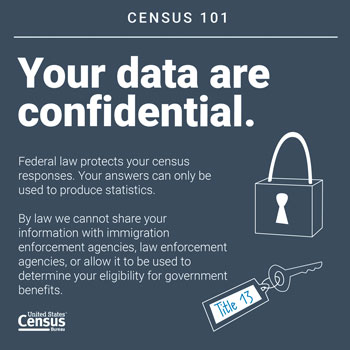 Once every 10 years, America comes together to count every resident in the United States. The decennial census was first taken in 1790, as mandated by the Constitution. It counts our population and households, providing the basis for reapportioning congressional seats, redistricting and distributing more than $675 billion in federal funds annually to support states, counties and community programs — impacting housing, education, transportation, employment, health care and public policy.
Once every 10 years, America comes together to count every resident in the United States. The decennial census was first taken in 1790, as mandated by the Constitution. It counts our population and households, providing the basis for reapportioning congressional seats, redistricting and distributing more than $675 billion in federal funds annually to support states, counties and community programs — impacting housing, education, transportation, employment, health care and public policy.
The 2020 count will be the 24th United States census. National Census Day, the reference day used for the census, will be April 1, 2020. This is the first U.S. census to offer options to respond online or by phone, in addition to the option to respond on a paper form as with previous censuses. Counting an increasingly diverse and growing population is a massive undertaking. It requires years of planning and the support of thousands of people.
Ultimately, the success of the census depends on everyone’s participation. The census bureau notes that there are a variety of reasons some people don’t take part in the decennial census. The government says most common barriers to participation include not believing the census has any impact on an individual, not trusting the government with personal information and not having the time to fill out the questionnaire. Individual responses are confidential.
The results of the 2020 census will determine the number of seats for each state in the U.S. House of Representatives, which mirrors the number of delegates for each state in the electoral college, for elections between 2022 and 2030. State and local officials use census counts to redraw boundaries for congressional districts, state legislative districts and school districts. Census data as the basis for the distribution of federal funds. More than $675 billion in federal funding is allocated to states and communities each year for roads, schools, hospitals, health clinics, emergency services and more.
The 2020 census will ask the number of people living or staying at your home on April 1, 2020; whether the home is owned or rented; the sex of each person in the household; the age of each person in the household; the race of each person in the household; and the relationship of each occupant. There is no citizenship question asked. The census in 2020 will require counting an increasingly diverse and growing population of around 330 million people in more than 140 million housing units.
To get an accurate count, the census bureau must build an accurate address list of every housing unit, maximize self-response to the census and efficiently follow up with those who do not respond. The 2020 census is the first decennial census of the U.S. with a full internet option and the first to extensively use technology — instead of paper — to manage and conduct fieldwork.
“To ensure we protect the data, we continually research and upgrade methods and technology to safeguard data and protect the confidentiality of responses through secured systems,” the census bureau said.
A new decade approaches
- Details
- Written by Stephanie Crider

 How to resolve AdBlock issue?
How to resolve AdBlock issue? 








